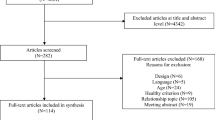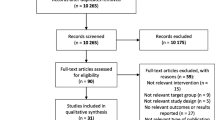Abstract
Therapeutic recreation camps have been considered to be an effective context for improving the psychosocial functioning of children with congenital heart disease (CHD). However, there is limited research regarding their impact on parents. Nine parents participated in two semi-structured interviews before and after their children attended a camp for children with CHD. Parents described their perceptions of their children’s camp experiences and identified the psychosocial utility of camp for themselves. Camp enabled parents to let their children grow and be independent, and helped reduce parents’ restricting and overprotective behaviours. Camp also provided parents with respite care, which alleviated their need to be ‘cardiac’ parents. These findings strengthen the case for therapeutic recreation camps and underscore the importance of expanding camp access to more families affected by CHD.
Similar content being viewed by others
References
Agha, M. M., Glazier, R. H., Moineddin, R., Moore, A. M., & Guttmann, A. (2011). Socioeconomic status and prevalence of congenital heart defects: Does universal access to health care system eliminate the gap? Birth Defects Research, 91, 1011–1018. doi:10.1002/bdra.22857.
Bar-Mor, G., Bar-Tal, Y., Krulik, T., & Zeevi, B. (2000). Self-efficacy and physical activity in adolescents with trivial, mild, or moderate congenital cardiac malformations. Cardiology in the Young, 10, 561–566. doi:10.1017/S1047951100008829.
Bloomberg, L. D., & Volpe, M. (2008). Completing your qualitative dissertation: A roadmap from beginning to end. Thousand Oaks: Sage.
Bowen, M. (1966). The use of family theory in clinical practice. Comprehensive Psychiatry, 7, 345–374. doi:10.1016/S0010-440X(66)80065-2.
Bowen, M. (1974). Alcoholism as viewed through family systems theory and family psychotherapy. Annals of the New York Academy of Sciences, 233, 115–122. doi:10.1111/j.1749-6632.1974.tb40288.x.
Braun, V., & Clarke, V. (2006). Using thematic analysis in psychology. Qualitative Research in Psychology, 3, 77–101. doi:10.1191/1478088706qp063oa.
Braun, V., & Clarke, V. (2013). Successful qualitative research: A practical guide for beginners. London: Sage.
Bultas, M. W., Budhathoki, C., & Balakas, K. (2013). Evaluation of child and parent outcomes after a pediatric cardiac camp experience. Journal Specialists in Pediatric Nursing, 18, 320–328. doi:10.1111/jspn.12040.
Bultas, M. W., Steurer, L. M., Balakas, K., Brooks, C., & Fields, H. (2014). Psychosocial outcomes of a summer overnight recreational experience for children with heart disease. Journal of Child Health Care, 19, 542–549. doi:10.1177/1367493514540350.
Canadian Congenital Heart Alliance. (2013) About congenital heart defects. Retrieved from http://www.cchaforlife.org/about-congenital-heart-defects.
Connor, J. A., Kline, N. E., Mott, S., Harris, S. K., & Jenkins, K. J. (2010). The meaning of cost for families of children with congenital heart disease. Journal of Pediatric Health Care, 24, 318–325. doi:10.1016/j.pedhc.2009.09.002.
Czosek, R. J., Bonney, W. J., Cassedy, A., Mah, D. Y., Tanel, R. E., Imundo, J. R., & Marino, B. S. (2012). Impact of cardiac devices on the quality of life in pediatric patients. Circulation Arrhythmia Electrophysiology, 5, 1064–1072. doi:10.1161/circep.112.973032.
Elliot, R., Fischer, C. T., & Rennie, D. L. (1999). Evolving guidelines for publication of qualitative research studies in psychology and related fields. British Journal of Clinical Psychology, 38, 215–229. doi:10.1348/014466599162782.
Esterberg, K. G. (2002). Qualitative methods in social research. Boston: McGraw Hill.
Franck, L. S., McQuillan, A., Wray, J., Grocott, M. P., & Goldman, A. (2010). Parent stress levels during children’s hospital recovery after congenital heart surgery. Pediatric Cardiology, 31, 961–968. doi:10.1007/s00246-010-9726-5.
Fredriksen, P. M., Mengshoel, A. M., Frydenlund, A., Sorbye, O., & Thaulow, E. (2004). Follow-up in patients with congenital cardiac disease more complex than haemodynamic assessment. Cardiology in the Young, 14, 373–379. doi:10.1017/s1047951104004044.
Goodwin, D. L., & Staples, K. (2005). The meaning of summer camp experiences to youths with disabilities. Adapted Physical Activity Quarterly, 22, 160–178.
Heart and Stroke Foundation. (2012) Congenital heart disease. Retrieved from http://www.heartandstroke.com/site/c.ikIQLcMWJtE/b.3484063/k.E84C/Heart_disease__Congenital_heart_disease.htm.
Lawoko, S., & Soares, J. J. (2003). Quality of life among parents of children with congenital heart disease, parents of children with other diseases and parents of healthy children. Quality of Life Research, 12, 655–666. doi:10.1023/A:1025114331419.
Lawoko, S., & Soares, J. J. (2006). Psychosocial morbidity among parents of children with congenital heart disease: A prospective longitudinal study. Heart and Lung, 35, 301–314. doi:10.1016/j.hrtlng.2006.01.004.
Lincoln, Y. S., & Guba, E. G. (1985). Naturalistic Inquiry. Newbury Park: Sage.
Linde, L. M., Rasof, B., & Dunn, O. J. (1970). Longitudinal studies of intellectual and behavioral development in children with congenital heart disease. Acta Paediatrica Scandinavica, 59, 169–176. doi:10.1111/j.1651-2227.1970.tb08984.x.
Linde, L. M., Rasof, B., Dunn, O. J., & Rabb, E. (1966). Attitudinal factors in congenital heart disease. Pediatrics, 38, 92–101.
Luyckx, K., Goossens, E., Missotten, L., & Moons, P. (2011). Adolescents with congenital heart disease: The importance of perceived parenting for psychosocial and health outcomes. Journal of Developmental and Behavioral Pediatrics, 32, 651–659. doi:10.1097/DBP.0b013e3182331e99.
Mackey, M. C. (2012). Evaluation of qualitative research. In P. Munhall (Ed.), Nursing research: A qualitative perspective (5th ed., pp. 517–531). Toronto: Jones and Bartlett.
McDaniel, S. H., & Campbell, T. L. (1998). Family caregiving and coping with chronic illness. Families, Systems, and Health, 16, 195–196. doi:10.1037/h0089941.
Meltzer, L. J., & Johnson, S. B. (2004). Summer camps for chronically ill children: A source of respite care for mothers. Children’s Health Care, 33, 317–331. doi:10.1207/s15326888chc3304_5.
Moola, F., Faulkner, G. E., Kirsh, J. A., & Kilburn, J. (2008). Physical activity and sport participation in youth with congenital heart disease: Perceptions of children and parents. Adapted Physical Activity Quarterly, 25, 49–70.
Moola, F. J., Faulkner, G. E., White, L., & Kirsh, J. A. (2014). The psychological and social impact of camp for children with chronic illnesses: A systematic review update. Child: Care Health and Development, 40, 615–631. doi:10.1111/cch.12114.
Moola, F. J., Faulkner, G., White, L., & Kirsh, J. (2015). Kids with special hearts: The experience of children with congenital heart disease at Camp Willowood. Qualitative Research in Sport, Exercise and Health, 7, 271–293. doi:10.1080/2159676X.2014.926968.
Moola, F., Fusco, C., & Kirsh, J. A. (2011). The perceptions of caregivers toward physical activity and health in youth with congenital heart disease. Qualitative Health Research, 21, 278–291. doi:10.1177/1049732310384119.
Munhall, P. (2012). Nursing Research: A qualitative perspective (5th ed.). Toronto: Jones and Bartlett Learning.
Nembhard, W. N., Wang, T., Loscalzo, M. L., & Salemi, J. L. (2010). Variation in the prevalence of congenital heart defects by maternal race/ethnicity and infant sex. The Journal of Pediatrics, 156, 259–264. doi:10.1016/j.jpeds.2009.07.058.
Nicholas, D. B., Williams, M., & MacLusky, I. B. (2009). Evaluating group work within a summer camp intervention for children and adolescents with asthma. Social Work With Groups, 32, 209–221. doi:10.1080/01609510802527425.
Ong, L., Nolan, R. P., Irvine, J., & Kovacs, A. H. (2011). Parental overprotection and heart-focused anxiety in adults with congenital heart disease. International Journal of Behavioral Medicine, 18, 260–267. doi:10.1007/s12529-010-9112-y.
Patton, M. Q. (1990). Qualitative evaluation and research methods (2nd ed.). Newbury Park: Sage.
Peckover, S. (2002). Supporting and policing mothers: An analysis of the disciplinary practices of health visiting. Journal of Advanced Nursing, 38, 369–377. doi:10.1046/j.1365-2648.2002.02197.x.
Phares, V., Lopez, E., Fields, S., Kamboukos, D., & Duhig, A. M. (2005). Are fathers involved in pediatric psychology research and treatment? Journal of Pediatric Psychology, 30, 631–643. doi:10.1093/jpepsy/jsi050.
Shelton, K. J., & Witt, P. A. (2011). Therapeutic camps as respite care providers: Benefits for families of children with disabilities. Therapeutic Recreation Journal, 45, 17–31.
Simons, L. E., Blount, R. L., Campbell, R., Hubbard, A., Goodwin, B., Devine, K., & Benoit, M. (2007). Decreases in anxiety associated with participation in a camp for children with cardiac defects. Cardiology in the Young, 17, 631–637. doi:10.1017/s1047951107001485.
Smith, K. E., Gotlieb, S., Gurwitch, R. H., & Blotcky, A. D. (1987). Impact of a summer camp experience on daily activity and family interactions among children with cancer. Journal of Pediatric Psychology, 12, 533–542. doi:10.1093/jpepsy/12.4.533.
Sparacino, P. S., Tong, E. M., Messias, D. K., Foote, D., Chesla, C. A., & Gilliss, C. L. (1997). The dilemmas of parents of adolescents and young adults with congenital heart disease. Heart and Lung, 26, 187–195. doi:10.1016/S0147-9563(97)90055-8.
Sparkes, A. C., & Smith, B. (2014). Qualitative research methods in sport, exercise and health: From process to product. London: Routledge.
Spurkland, I., Bjørnstad, P. G., Lindberg, H., & Seem, E. (1993). Mental health and psychosocial functioning in adolescents with congenital heart disease. A comparison between adolescents born with severe heart defect and atrial septal defect. Acta Paediatrica, 82, 71–76. doi:10.1111/j.1651-2227.1993.tb12520.
Walker, D. A., & Pearman, D. (2009). Therapeutic recreation camps: An effective intervention for children and young people with chronic illness? Archives of Disease in Childhood, 94, 401–406. doi:10.1136/adc.2008.145631.
Warady, B. A. (1994). Therapeutic camping for children with end-stage renal disease. Pediatric Nephrology, 8, 387–390. doi:10.1007/BF00866373.
Wu, Y. P., Prout, K., Roberts, M. C., Parikshak, S., & Amylon, M. D. (2011). Assessing experiences of children who attended a camp for children with cancer and their siblings: A preliminary study. Child and Youth Care Forum, 40, 121–133. doi:10.1007/s10566-010-9123-5.
Wysocki, T., & Gavin, L. (2004). Psychometric properties of a new measure of fathers’ involvement in the management of pediatric chronic diseases. Journal of Pediatric Psychology, 29, 231–240. doi:10.1093/jpepsy/jsh024.
Acknowledgments
We thank the parents and campers of Camp Oki for sharing their invaluable experiences with us. This manuscript is dedicated to the memory of our campers who passed away as a result of CHD during the course of this research.
Funding
The study was supported by the Hospital for Sick Children Foundation, through the generous support of a donor family interested in improving the quality-of-life for children with congenital heart disease.
Author information
Authors and Affiliations
Corresponding author
Ethics declarations
Conflicting interest
The authors declare that there is no conflict of interest.
Rights and permissions
About this article
Cite this article
White, L.C., Moola, F.J., Kirsh, J.A. et al. A Therapeutic Recreation Camp for Children with Congenital Heart Disease: Examining Impact on the Psychosocial Well-Being of Parents. J Child Fam Stud 25, 3034–3043 (2016). https://doi.org/10.1007/s10826-016-0474-x
Published:
Issue Date:
DOI: https://doi.org/10.1007/s10826-016-0474-x




